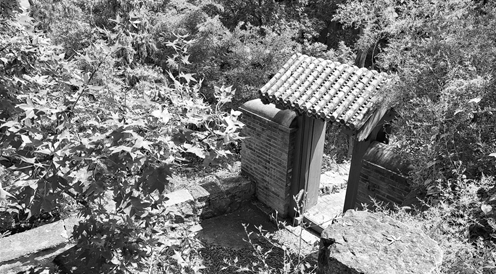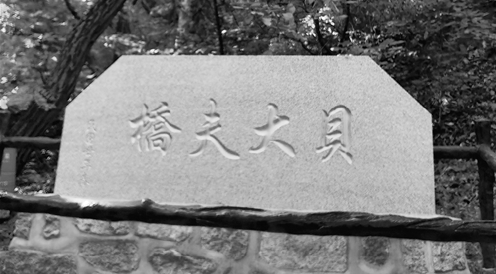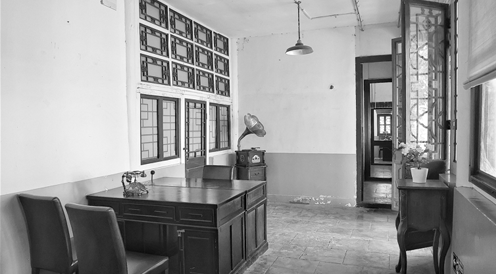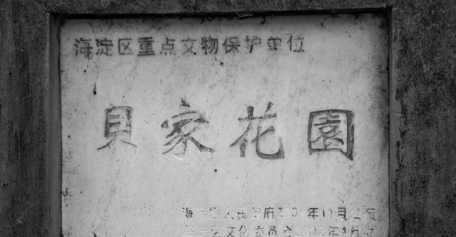Remembering a dear friend
French physician witnessed huge changes in China

Irevisited Jardin Bussiere with a group of friends on a beautiful Saturday morning in October. The first time had been about seven or eight years earlier, when I drove to Mount Yangtai in Beijing with friends.
We happened to see a sign for"Jardin Bussiere" on the side of the road and visited it out of curiosity. We discovered not only a perfect combination of Chinese and Western garden architecture, and refreshing ecological beauty, but also references to many people and events in modern history.
I've constantly talked about this storied place since. I felt particularly proud that in 2018, through my recommendation to the China Society for People's Friendship Studies, a commemoration marking the 60th anniversary of the death of Dr Bussiere was held in Beijing. At that event, I had the privilege of meeting Bussiere Jr. and Michael Lindsey Jr., as well as Zhang Wei, author of The Legend of Bussiere.
Jean Jerome Augustin Bussiere was a French doctor who lived in Beijing for 41 years in the first half of the last century. While wholeheartedly regarding China as his second home with no intention to become involved in Chinese politics, he personally witnessed and experienced many major events, such as the May Fourth Movement, the work-study program for Chinese students in France and the War of Resistance Against Japanese Aggression (1931-45). And he made major contributions we should not forget.
As a prominent physician, Bussiere counted many celebrities, such as Sun Yat-sen, Mei Lanfang and even Mao Zedong among his patients. As president of the French Hospital in Beijing and the founding director of Cathay Medical College in Shanghai, he made significant contributions to the development of modern medicine and health education in China.
During the invasion by Japanese forces, Bussiere risked his life to purchase and transport medicine for the Communist Party of China's Eighth Route Army. As he gave medical advice to and treated many dignitaries and members of the social elite, he became a celebrity himself. Bussiere also treated those less well-off without charge and saved countless lives.
Due to his prestige and connections in the fields of Sino-French and Sino-foreign exchanges, as well as his generosity and hospitality, the"Bussiere Salon" at his home in Beijing naturally became an important social center frequented by celebrities from all walks of life. After the completion of Jardin Bussiere, many social activities at Bussiere Salon gradually moved from his courtyard home in Datianshuijing Hutong in downtown to the more beautiful Jardin Bussiere on Mount Xishan in western Beijing.
Among Bussiere's many friends was his lifelong companion and confidant, the Sinologist Andre d'Hormon. The duo facilitated the establishment of the Sino-French Friendship Association, the Sino-French University, and the Peking Research Institute. In his later years, the Sinologist painstakingly completed the French translation of Dream of the Red Chamber, introducing this classic Chinese masterpiece to France and the world.
Another friend of Bussiere was the young diplomat, Alexis Leger. Not only did Leger rise to the position of de facto head of the French Foreign Ministry in the two decades leading up to World War II but also his famous epic poem, Anabase, written on Mount Xishan, won him the Nobel Prize for Literature four decades later in 1960 under the pseudonym "Saint-John Perse".
Another international friend was Michael Lindsey from the United Kingdom. It was through Jardin Bussiere that this professor of economics at Yenching University escaped from the Japanese invaders, eventually fleeing to Yan'an in what is now Shaanxi province and becoming the founding architect of the communication system of the CPC's stronghold areas.
Perhaps his most touching story is that of his love with Wu Sidan. Wu came from a prominent family and had experienced illness since she was a child.
After seeing her, Bussiere believed that she didn't have any major health issues and encouraged her to embrace life outdoors.
With Bussiere's encouragement, she not only became healthy but also was admitted to Fu Jen Catholic University, majoring in fine arts. Because Wu Mingyuan, her father, was general manager of the Sino-French Industrial Bank, where Bussiere was a board director, Wu Sidan became a frequent visitor to Jardin Bussiere. Through this young female friend, Bussiere gained a deeper understanding of the breadth and profundity of Chinese culture. Seeing Bussiere overwhelmed with work, Wu Sidan often went to his clinic to help him and even simply offered to serve as his assistant after graduating from university.
After more than 10 years, the affection between them gradually grew into love, and they were married. Bussiere and his young wife left China in 1954 and returned to France. One year later, Wu Sidan became pregnant and gave birth to a son. Three years later, Bussiere passed away.
She endured hardships in bringing up her son, who followed in his father's footsteps to become a physician. On her last trip back to China in 1992, she went to take a photo in front of Jardin Bussiere without entering.
Wu Sidan passed away in 2013.
I was impressed during this visit to see the improvement at the garden. From the watchtower, north house, south house and other major attractions, the background has been enriched with old photos, making my friends, who visited it for the first time, even more pleasantly surprised. The fragmented stories and anecdotes I had been intermittently telling them along the way now suddenly became alive and complete.
The three-story watchtower, originally intended for security purposes, was used by Bussiere as his clinic. Upon visiting each room in each floor, we could vividly picture the touching scene of Bussiere, with the help of Wu Sidan, concentrating on diagnosing and operating on village patients from the neighborhood.
The north house, built by the mountain, was the main living place of the owner at that time, and its apparent Chinese style fully reflects the owner's respect for the aesthetic traditions of Chinese architecture.
Looking closely at all the details of its design, one cannot fail to notice the exquisite Western architectural craftsmanship everywhere. In front of the house, there is the largest flat square in the garden, and opposite the ruins of a European-style fountain stands a large empty stone pillar scaffolding. We took photos there to commemorate the past of Jardin Bussiere, imagining how many Chinese and foreign celebrities had gathered under the cool shade of lush green vines, eating, drinking and discussing issues with great interest in a very relaxing atmosphere.
For this visit, I brought the book The Legend of Bussiere autographed by Zhang, the author, and Bussiere Jr. and Lindsey Jr. five years ago. Zhang and his wife He Jie spent several years, starting with Mount Xishan, traveling in many places in China and France, doing arduous and careful research and interviews. They got a great amount of firsthand information and wrote the most comprehensive and detailed biography of Bussiere to date.
To our pleasant surprise, when we had just arrived, Zhang also appeared on the mountain road unexpectedly. It turned out that this year is the 60th anniversary of the establishment of diplomatic relations between China and France, and a Chinese TV station had invited Zhang as a special guest to be interviewed in Jardin Bussiere. When we finally arrived at the south house, which overlooked the skyline of Beijing, Zhang's interview had just ended. He happily chatted with us and kindly told us more interesting anecdotes.
The arborvitaes, maples and locusts planted back then have grown into towering trees. We were so fortunate to enjoy the beautifully wooded garden and listen to the narration of the deeply knowledgeable author about the history of this place.
All this once again brought us back to the heyday of Jardin Bussiere.
Bussiere and his pioneering peers, with hearts transcending the boundaries of race and nation in his time, deeply touched us.
As we had to bid farewell to Jardin Bussiere, each of us cherished a shared wish that more people will be able to appreciate this beautiful legend of "the pioneering generation planting trees, and the later generation enjoying the shade".
The writer is executive director of the MNC Council for Carbon Neutrality.





Today's Top News
- Xi taps China's deep wisdom for global good
- New rules aim for platforms' healthy growth
- Chinese web literature grows overseas
- Postgrad exam trend points to thoughtful approach
- World's highest urban wetland a global model
- How China's initiatives are paving a new path to a better world






























